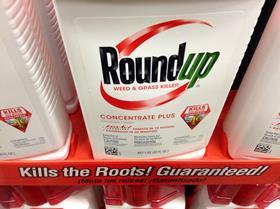
The EU has voted to renew the licence for glyphosate, ending months of deadlock related to concerns over the chemical’s safety and environmental impact.
Glyphosate, which is the active ingredient in Monsanto’s widely used Roundup weedkiller, has been reauthorised for five years after a proposal in the EU Commission’s Appeal Committee was passed by 18 votes to nine.
The commission said the new licence would begin before the current one runs out on 15 December.
The UK, Spain, the Netherlands and Poland were among the countries that voted in favour of the chemical’s reauthorisation, while Germany, France and Italy all voted against. Portugal was the only country to abstain.
The NFU welcomed the news, saying the renewal was “testament to the hard work of British farmers in lobbying MEPs over its safety and benefits”.
Vice president Guy Smith said: “I would like to pay tribute to the farmers across the country who have lobbied their MEPs and invited them out on to farm to see first-hand the benefits glyphosate brings, and those who have made the case for glyphosate’s reauthorisation on social media. I am convinced their efforts have helped us reach this positive outcome.”
He added: “It is good news that farmers and growers will be able to continue using glyphosate for another five years. However, the fact remains that there is absolutely no regulatory reason why it should not have been reauthorised for 15 years, as was originally proposed.”
While his position mirrors that of most British farmers, it contrasts with the concerns of environmentalists and other campaigners worried by the chemical’s alleged health risks.
Environmental critics say widespread use of glyphosate reduces biodiversity by killing plants essential to the habitats of various insects and animals, while a 2015 paper in the Lancet Oncology journal classified the chemical as “probably carcinogenic to humans”.
In March this year, the European Food Safety Authority (EFSA) and the European Chemicals Agency published their own study, concluding that the chemical was safe to use.
But leading US toxicologist Christopher Portier accused the two bodies of playing down the chemical’s cancer risk in the report.



